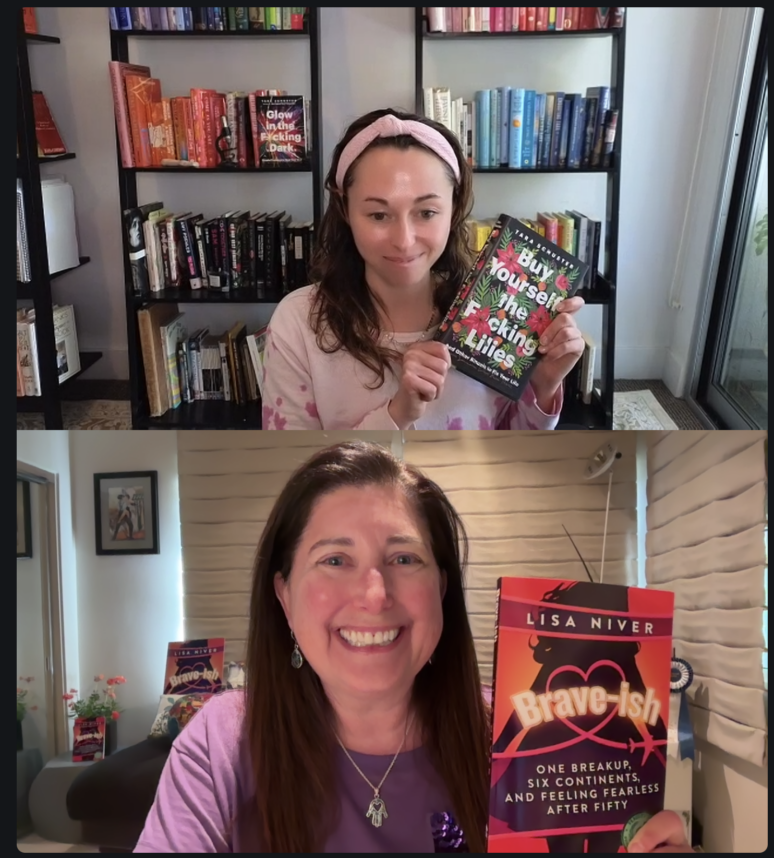
At the age of 13, Marissa Streit, CEO of PragerU, walked through the hallowed halls of Yad Vashem in Jerusalem and was overwhelmed by the enormity of the evil perpetrated by the Nazis during the Holocaust. Streit, who is Jewish, recalled asking a docent “How could this happen? How could people not stop it? Why weren’t they fighting? Did they not understand what could happen if they didn’t fight?” The docent’s reply is etched into Streit’s memory: “Well young lady, most people don’t fight until it’s too late and most people rely on others to do the fighting for them.”
To this day, Streit, 42, now a mother of three herself, still has nightmares where she sees herself as one of the freedom fighters during the Holocaust, but her experience at Yad Vashem still fuels Streit’s “courage to fight.“
The Los Angeles native was not the only visitor to Israel’s Holocaust museum to walk away determined not to allow the mass murder of Jews to happen again, but Streit followed a unique course, serving in Unit 8200 of the Israeli Defense Forces before returning to Los Angeles where she went from teaching elementary school to the CEO of Prager University (PragerU), an educational organization whose videos are watched 5 million times every single day.
Co-founded by author and talk show host Dennis Prager, PragerU’s videos have been praised and condemned, but rarely ignored. The organization estimates that nearly 1 in 3 Americans have watched a PragerU video.
Co-founded by talk show host Dennis Prager, PragerU’s videos have been praised and condemned, but rarely ignored. The organization estimates that nearly 1 in 3 Americans have watched a PragerU video. And the attacks, some of them high-profile, haven’t daunted Streit.
“If you don’t toe the line of what is expected, you experience extreme societal backlash and, sometimes, even worse than societal backlash — you can lose your job, you can lose your friends, you can be called all kinds of names and ad hominem attacks,” Streit told the Journal in a video interview from PragerU’s headquarters in Los Angeles. “I’m often called anti-woman or xenophobic. I speak more than four languages, so to call me xenophobic — it’s silly. But that’s what people will do when they don’t agree with you.”
Despite the backlash, Streit knows staying on the sidelines is not an option. “If you don’t fight against evil when you see it, you become part of it … you can’t stay in the middle.”
Under Streit’s leadership, PragerU has become a leading voice in the national debate. Since its founding in 2011, the organization claims that its five-minute videos have amassed over 8 billion views, nearly 2 billion in 2022 alone. “We get more viewers than CNN,” Streit said. “It’s incredible.” Beyond the internet PragerU is also entering the classroom — Florida’s Board of Education approved PragerU’s K-12 supplemental resources to be used in classrooms throughout the state, and more states could soon follow suit.
While critics portray PragerU as xenophobic and even racist, opposed to immigration and multiculturalism, Streit was born in America to an Australian father and Moroccan mother — who had met in Israel where her mother was working to integrate Moroccan Jews into Israeli society. Her parents divorced when she was seven, prompting Streit and her mother to move to Israel — which she described as her “spiritual homeland” — but maintained “a strong connection to the U.S.,” since her father and sister were still there. After serving in the IDF, Streit moved back to America and decided to study business and economics at UCLA because, she said, “like many Israelis, I had that go-getter mentality” and wanted to be independent. It was while she was studying at UCLA that Streit fell in love with teaching. “Given that I had a unique skill in that I spoke another language — Hebrew — and understood Israel’s history, I taught Hebrew school at $75 per hour. What a great way to make money as a college kid,” she chuckled.
 Immersed in the educational system at the ground level, Streit saw what children were and weren’t learning. Armed with a master’s degree in education, she became a teacher, describing her “sweet spot” as the fourth and fifth grades. She became an assistant head and head of a school — even starting a preschool — before working as the director of operations for the Israeli-American Council for less than a year.
Immersed in the educational system at the ground level, Streit saw what children were and weren’t learning. Armed with a master’s degree in education, she became a teacher, describing her “sweet spot” as the fourth and fifth grades. She became an assistant head and head of a school — even starting a preschool — before working as the director of operations for the Israeli-American Council for less than a year.
Eventually, someone from the education world connected her to Dennis Prager. “This person called me up and said, ‘Hey we are looking to start this new organization. It’s kind of an educational thing but it’s online, so we need somebody who has a digital background and who understands education but also knows how to develop a nonprofit from scratch,’” Streit said, adding that she had just received her MBA in nonprofit management and fit the criteria of what they were looking for. She met with Prager and his producer, Allen Estrin, a Hollywood screenwriter, and they sold her on the idea of five-minute YouTube videos to educate people about the conservative and pro-Israel point of view on various issues.
“They gave me the example of the Middle East problem … they’re like, ‘People don’t understand what is happening in Israel. They think that Israel is the biggest problem in the Middle East, this tiny little country the size of El Salvador or New Jersey … what if we could explain it to them in five minutes?’ I thought that idea was really interesting.”
– Marissa Streit
“They gave me the example of the Middle East problem,” Streit said. “And they’re like, ‘People don’t understand what is happening in Israel. They think that Israel is the biggest problem in the Middle East, this tiny little country the size of El Salvador or New Jersey … what if we could explain it to them in five minutes?’ I thought that idea was really interesting.” Estrin compared Streit to George Washington: “You’re like a general without an army,”
PragerU’s first available video on Israel, “The Middle East Problem,” sponsored by the Adam and Gila Milstein Family Foundation, has racked up over 14 million views. The former elementary school teacher who had once stood horrified at Yad Vashem was making a difference.
“I loved this idea of being able to provide people with food for thought, an alternative perspective, truth, and accessed for free,” Streit explained. “I’m not going to lie, I get lazy, too, and I’m busy, so I don’t want to read 600-page books. So the idea that I can watch a five-minute video that summarizes something complex and it’s summarized by one of the great explainers — like Dennis or others — I thought was very exciting.”
Selling donors on the potential of PragerU’s five-minute videos was an uphill battle at first. “It was really hard on a lot of people who felt very passionate about these ideas,” Streit recalled. The response would be, “Really? Why would you dumb it down to only five minutes? That’s not doing justice to the amount of education that needs to be had around the subject. You can’t possibly explain the importance of Israel in the Middle East in only five minutes. You can’t possibly explain the brilliance of the Constitution in only five minutes … They were literally offended by us when we pitched them on taking their 600-page book and turning it into five-minute content,” Streit said. And when PragerU argued to donors that “it’s actually harder and more expensive to make a five-minute video than an hour-and-a-half interview because brevity is actually hard,” the donors would reply: “What? You want money for only a five-minute video? Five minutes is: Grab your phone and film it.”
Other nonprofits that produced conservative content scorned the concept that PragerU’s videos should be advertised. “It’s the Hollywood model,” Streit said. “The Hollywood model is that the amount of money that you spend on your content, on production, is the amount of money that you spend on marketing … in the war of ideas, people think that it’s embarrassing to put money behind your ideas because people want to believe that if your idea is great, it’s going to grow its own legs and somehow go viral. But we fundamentally did not believe in that, and maybe one of the benefits of being in Hollywood is that we recognized that if Hollywood is doing it and if it’s good enough for Disney to put money behind their shows, then it should be good enough for our values and ideas.”
Despite the skepticism, PragerU stood its ground. “We, like many other visionaries and entrepreneurs, were willing to run against the herd,” Streit said. “This is one of the phrases that I like to use as a business entrepreneur, is to do what people are not doing. Dare to go where others won’t because that’s where the opportunity is.”
And its commitment to the five-minute video concept proved to be fruitful for PragerU. “The Middle East Problem,” PragerU’s first video to go viral, featured Dennis Prager discussing the Israeli-Palestinian conflict. “Semester after semester, we studied the Middle East conflict as if it was the most complex conflict in the world when in fact, it is probably the easiest conflict in the world to explain,” Prager, with his trademark baritone voice, explains in the video. “It may be the hardest to solve, but it is the easiest to explain. In a nutshell, it’s this: One side wants the other side dead. Israel wants to exist as a Jewish state and to live in peace. Israel also recognizes the right of Palestinians to have their own state and to live in peace. The problem, however, is that most Palestinians and many other Muslims and Arabs, do not recognize the right of the Jewish state of Israel to exist.” And the video has received 14.5 million views over nearly 10 years. “That one was when we realized that we were onto something,” Streit said.
Big Tech companies have taken action against PragerU’s video that the nonprofit believes were tantamount to censorship.
PragerU’s rise hasn’t been without controversy. Big Tech companies have taken action against PragerU’s video that the nonprofit believes were tantamount to censorship. “We’ve had multiple videos that have been marked or deemed as ‘misinformation’ or ‘hate speech’ and because of that, we’re either blocked on YouTube or we are not allowed to advertise them,” Streit said. A YouTube spokesperson told Newsweek in November 2020 that they had removed an episode of conservative commentator Candace Owens’ show on PragerU with The Daily Wire’s Michael Knowles from a year earlier because that episode violated YouTube’s hate speech policies. In that episode, Owens and Knowles implied “that transgender individuals are mentally ill,” Newsweek reported at the time.

PragerU filed a lawsuit against Google and YouTube in 2017, alleging that the tech companies discriminated against it by restricting the reach of more than 50 PragerU videos on YouTube. The videos include Dennis Prager’s 2014 “The Ten Commandments: What You Should Know” and columnist Bret Stephens’ “Should America Be the World’s Policeman?” in 2015. YouTube labeled some of these videos as “inappropriate” for children and demonetized others altogether, the lawsuit alleged. The lawsuit ultimately failed after a court concluded that, as a private company, YouTube’s actions were protected under the First Amendment.
During Senate testimony in 2019, Google executive Karan Bhatia defended his company’s actions, arguing that the videos in question would only be inaccessible to 1.5% of YouTube viewers who are using YouTube’s “restricted” mode, including “churches, schools, maybe libraries that don’t want to have their viewers exposed to more mature content.” The Ten Commandments video had “references to murder and I believe potentially Nazism and World War II,” Bhatia added. In the video, Prager argues that “we all need God to tell us” that murder is wrong because “unless there is a God, all morality is just opinion and belief.” He proceeds to argue: “Another problem with the view that you don’t need God to believe that murder is wrong, is that a lot of people haven’t shared your view … In the 20th century millions of people in communist societies and under Nazism killed about one hundred million people — and that doesn’t count a single soldier killed in war.” As in “‘thou shall not murder,'” she said. “You can’t make this stuff up.”
The alleged Big Tech censorship against PragerU goes beyond Google and YouTube. “On Facebook, we’ve been shadowbanned, which basically means we upload a video and it looks like it’s up there but nobody can see it,” Streit claimed, further alleging that Instagram has shadowbanned its videos as well.
Streit also claimed that PragerU has “been denied the ability to reach people with our ads on Spotify and Hulu … We get job postings pulled down at times from LinkedIn, and have had a variety of vendors refuse to work with us due to our conservative beliefs.” Nor was PragerU allowed to advertise on Twitter (since renamed to X) until Elon Musk took over the platform, Streit alleged.
NewsGuard — an online platform that rates the reliability and credibility of various news sources and institutions — has deemed PragerU as “misinformation,” Streit said. If you open your browser through Microsoft Edge, which comes with the NewsGuard extension, “you’ll get a warning sign that will say that our content is ‘misinformation’ or ‘hate speech,’” she said. Matt Skibinski, General Manager of the NewsGuard, told the Journal, “NewsGuard rates each source based on the same basic, apolitical criteria of journalistic practice. Under this apolitical rating system, many conservative-leaning websites outscore similar left-leaning news brands, and vice versa. For example, FoxNews.com is rated higher than MSNBC.com, The Daily Caller is rated higher than The Daily Beast, and The Daily Wire rates higher than The Daily Kos. These examples alone should dispel any notion that NewsGuard is biased against conservative websites.”
The reason why all these Big Tech companies treat PragerU this way is because they’re all “essentially abiding by the same rules and regulations” in terms of policing speech on issues like climate change, COVID-19, transgenderism and even Israel, because under the leftist doctrine of intersectionality, “you’re being mean to minorities” if “you don’t speak about Israel in a certain way,” Streit said.
As of publication time, Google, Facebook, Twitter/X, LinkedIn, Hulu and Spotify have not responded to the Journal’s requests for comment on Streit’s allegations.
Despite the alleged Big Tech censorship, PragerU still has 4.5 million followers on Facebook and 3.12 million subscribers on YouTube; its YouTube videos receive hundreds of thousands of views. “We are fighting uphill constantly, and those millions of followers are despite all the throttling, shadow-banning and tipping of the scales that comes from Big Tech,” Streit said. “We can only imagine how many more views we could have if they didn’t censor us or label us as misinformation.” A representative from PragerU told the Journal that despite the 4.5 million Facebook followers, its posts on Facebook and Instagram have “low reach comparatively” due to the apparent continuation of shadow-banning.
PragerU is not relying on Big Tech platforms alone for people to see its content. “We’re building our own audience,” Streit said, adding that the conservative nonprofit has its own email lists and an app for people to download.
PragerU is not relying on Big Tech platforms alone for people to see its content. “We’re building our own audience,” Streit said, adding that the conservative nonprofit has its own email lists and an app for people to download. The organization claims that over 1 million users have downloaded the app and that the nonprofit gained an additional 2 million subscribers to their email lists last year.
Today, PragerU has wide-ranging content in addition to its trademark five-minute videos; for instance, it has daily shows hosted by Generation Z personalities such as Amala Ekpunobi, a self-described far-left activist who has become a conservative influencer. The conservative nonprofit also releases four 20-minute documentaries a year, such as the recently released “Unwoke Inc.” featuring Ekpunobi documenting the rise of wokeism in the corporate sphere and how to fight back against it. Prager has his weekly hourlong fireside chats. PragerU is also producing kids’ content, aiming to teach the youth things like “financial literacy, important biographies, critical thinking, [and] character development,” Streit said. Streit herself has a weekly, hourlong interview show, where she discusses topics “ranging from parenting, the sexualization of children, education, all kinds of myths that we’ve been told about fossil fuels or overpopulation, or even food,” she said. “Like what should we eat?” Streit described the variety of content available on PragerU as “broccoli for your brain” for people of all ages.
When the Journal interviewed Streit, PragerU had just finished filming a video of a 100-year-old Holocaust survivor as part of the organization’s “Stories of Us” series of 5-10 minute videos. “He’s horrified by the fact that people don’t believe that the Holocaust happened,” Streit said. “Now there’s Holocaust denying, because we live in a society where truth doesn’t matter. We’re in a society that actually doesn’t put truth first, it puts wokeism first or what sounds good first or tyranny of the minority first … truth is not being held as a value — not in our media, not in our education.” According to Streit, the Holocaust survivor said that he “never thought in his lifetime after living through the Holocaust he will have to travel to all corners of the Earth and show people the numbers on his wrist and tell people that the Holocaust happened. That evil happened in the hands of humans because others did not fight hard enough to stop it.” According to Streit, the survivor also said, “Here we are: We’re living in an era when people yet again feel fearful to fight against evil because they don’t want to feel like they’re an outsider or they don’t want to speak up or they want to rely on another person to fight for them.”
One common misconception about PragerU is that “we’re a political organization because we teach conservative values and conservative ideas and these days everything has become political, including sports,” Streit said. “To me, it’s really more about preserving traditional American values or ideas or ideologies that have made America what it is.”
One common misconception about PragerU is that “we’re a political organization because we teach conservative values and conservative ideas and these days everything has become political, including sports,” Streit said. “And so if you don’t lean left, you’re immediately a right-wing activist. To me, it’s really more about preserving traditional American values or ideas or ideologies that have made America what it is.”
Asked what video she would recommend to those on the left who may not be familiar with PragerU, Streit chose, “Why I Left the Left,” by conservative commentator Dave Rubin. Rubin left the left “because he dared to wrestle,” Streit said. “He actually followed the traditions of his forefathers of wrestling with this concept that he was always on the left, he was told that he needs to be on the left, but he dared to wrestle. And he ended up leaving the left because he realized that the classical liberals that most Jews want to be don’t have a home anymore on the left.” She added: “If you are a classical liberal and you really believe in freedom of speech and personal choice, and perseverance and reward based on merit, and all of those characteristics that many Jewish homes teach their kids — wake up early and hustle and work hard and the harder you work the more you’ll get rewarded — all those values, those are not left-wing values … you may disagree with Dave, but you might find yourself in a similar spot that he is in. It’s a freer spot.”

Streit had another message for Jews on the left: “The Jewish people are called the Nation of Israel. What does Israel mean? It means to wrestle with God. It means to wrestle with ideas … why is it my group of people, the Jews, who are so locked into leftism that they’re not willing to hear an alternative perspective?” Streit said. “That should be so counter to what we do as Jews.” She added that “we are the nation that if the university says so, we believe every single word. We worship every word that comes out of university. There’s something quite ironic about that. If there is a message that I would have for the Jewish Journal audience, it is to think about that and allow them to open their mind and wrestle with ideas … when you wrestle with ideas, you become smarter. It expands your intellectual bandwidth.”























 More news and opinions than at a Shabbat dinner, right in your inbox.
More news and opinions than at a Shabbat dinner, right in your inbox.